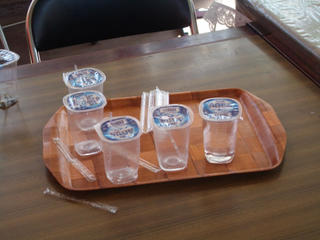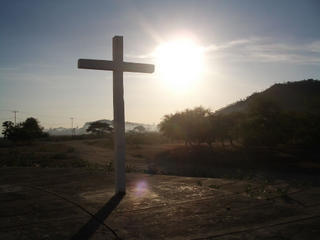Kultura (Part One)
Being a human being living within a culture* (When I talk about culture I'm also talking about the general conditions/constraints of lives lived in a certain place) is (I imagine) somewhat akin to being a fish living in water.
This (intentionally anthropomorphised) fish knows about the water, it sees it every day, it can study and analyse it until the (purely metaphorical) cows come home. However, what the fish can't do is transcend its intellectual understanding of the water. It will never really understand on a gut, emotional, heart, whatever level what the water means to it and how much of the water is merely one particular way (of many possible ways) of arranging life. It might be better than other ways of arranging breathing and movement or it might be worse. Probably it has both strengths and weaknesses.
This goes on until our clever fish invents a machine allowing it to leave the water. Only then can the fish step outside the thing it has always known, compare it with something different, and see both more clearly. Returning to people and culture, it is much the same. Most of what our societies run on is just one possible arrangement of cultural, social, physical, psychological and other factors. It is far from universal and chances are there is another culture somewhere that does every single thing differently. If this sounds impossible, you need to go somewhere a long way away immediately.
The key difference (I am not a biologist) between humans and fish is that we (those with the necessary financial resources at least) can leave our "home" culture far more easily than a fish can leave water. Whether we survive the experience is harder to say. An old expression goes: (or at least there should be one that goes) "If you survive a year in a foreign culture you are a goodtravelerr, if you return as the same person who left you are a bad one."
To me all of this creates a compelling case and reason why everyone should travel to at least a few significantly different places as early (before the cake is baked) in their conscious lives as possible (There are other reasons also, but these tend to be less intellectual and more fun).
In short, we can only see our own culture for what it is when we have lived in another. (For example, I was shocked to discover recently that some societies believe there are more important differences between humans and animals than the ability to acquire a mortgage.)
It is important to remember there is a spectrum (there's ALWAYS a spectrum) of cultural difference. The woman who moves from her comfortable life in the expensive Adelaide Hills to a mining town in Western Australia is likely to experience more of this "cultural dissonance" than an executive living a well resourced expatriate lifestyle during a six month stint in Hong Kong.
Therefore, I'm not being snobbish about this and restricting it to international travel. Any travel of any kind is good full stop. Taken further, "traveling" into sub-cultures within your own society can also result in a similar experience. The point is to get as uncomfortable as possible. Obviously the amount of information available in a western society also allows virtual traveling and a well informed person today has the capacity to understand other cultures (and consequently their own) to a greater degree than in anytime past.
However, for cultural dissonance par excellence I also suggest a few practical ideas:
* Waking up in a small village on a tropical island to the calls of seven competing (both for earliness and overall volume) roosters (whose only purpose in life is to provide violent entertainment for their owners);
* Having this sound soon supplanted by the man next door who decides some nondescript Brazilian elevator music needs to be surgically bored into the heads of everyone in the neighbourhood (including his young family) before breakfast AND the fact no-one complains;
* Having a drink from your limited bottled water supply (because you will get seriously ill if you drink the tap water - a choice the majority of locals are not able to make);
* Salivating at the thought of hearing news in English on Radio Australia because every other news source is in one of the many languages here that you do not understand;
* Realising that by 8am it is already as hot as a summer midday in Melbourne;
* Covering yourself in (toxic) mosquito repellent because otherwise your workplace and the outside world generally contains insects that can give you serious and (potentially) life threatening diseases - realising that this only reduces the risk of said diseases;
* Walking to the main road to the excited chorus of "Malae! Malae!" provided by the genuinely excited children, many of whom have been called by their mothers to see the passing spectacle;
* Catching a taxi to work with a young man who also thinks you require early hearing impairment. This man on average will not have a valid taxi driver registration, instead filling his windscreen and interior spaces with a seriously tacky assortment of decals, soft toys, flags, mirrors, glare protectors and other miscellaneous shiny objects. This has the added benefit of reducing his (and your) field of vision (through the windscreen) to something similar to trying to peek under a closed door. Regardless of anything else he will drive extremely slowly (in stark contrast to his Chinese brethren) and nurse his car like it is likely to fall apart any minute (often a reasonable assumption). Despite this he will find ways to endanger your life through a poor understanding of the concept that two objects cannot exist in the same space as applied to overtaking and the opposite lane of the road. Finally, he will not EVER wear a seatbelt (neither will anyone in any vehicle anywhere) and sometimes be so ?amused? (I haven't been able to pin down the exact emotion yet) at your very existence that he will spend more time watching you than the road and respond to your every statement/question with a giggle. When it comes time to pay the fare, there is no "right" amount and taxi drivers seem generally at the mercy of their passengers, unless of course you happen to be a woman and then it is the other way around;
* Watching the many people weaving in and out of traffic on motorbikes and scooters wearing the compulsory ¨ice cream container¨ helmet which apart from being made from thin metal of some kind is for all intents and purposes as protective as its nickname (among the malaes anyway) suggests. It has no chin strap and I'm sure it would escape to safety in the event of an accident well before your head encountered anything harder than air. Even more disturbing is the sight of adult(s) wearing these "helmets" while their children and/or babies ride or are carried without even this protection. One fellow volunteer suggests that either cultural or nutritional issues have reduced the Timorese capacity to link cause and effect. I find this theory quite offensive and think it is perhaps a combinatnecessitycessity and the fatalistic approach to life that persecution, disempowerment and religion can breed. I hope to write more on this later as it creates a host of interesting issues when viewed in the context of a newly independent nation, individuals endeavouring to improve their lives and capacity building;
* Realising just how rubbery "rubber time" can be and that the western concept of a workplace as a place workers spend the majority of the working week is not accepted everywhere, but that many people will turn up on weekends to socialise;
* Having a colleague tell you (with great sincerity) he will finish the short evaluation report required after one of your organisation's training sessions SOON, when this is the seventh such session this year and none of the previous reports were completed either;
* Spending your day at work sweltering in the heat and feeling guilty as your colleagues add two layers of clothing the moment you turn on a fan or air conditioner (if you are lucky enough to have one);
* Generally being so much more wealthy than the people around you (despite being a volunteer by western standards) that (whether you like it or not) you form part of an elite earning roughly 24 times the average local income. This is roughly the equivalent of both Sam and myself independently being millionaires in Australia. You also need to remember that most other national NGO international staff are on 3-5 times what we are on and that sitting on top of this obscene heap of wealth are the many UN'ers, international NGO staff and others who sometimes earn 2-4 times this again. A similar ratio in Australia would see many of these people on 5-10 million dollar a year salaries. (Of course, these figures are illustrative estimates only - unsurprisingly malaes don't talk about their salaries much here);
* Finally....no-one seems to use knives here, just forks and spoons. Spoons seem to be used for cutting when necessary and forks to help assemble food on the spoon.
 Serious crimes against the environment series #134
Serious crimes against the environment series #134Plastic cups which hold just 300ml of water made in such a way to make re-use impossible and sold with accompanying disposable plastic straws which are also individually encased in plastic. These cups are imported into Timor, a country that burns the vast majority of its packaging and household rubbish due to an almost complete lack of waste management services. These cups are paid for and provided to many NGOs in Dili by many donors who should know better. USAID to name one.
(Kultura part two coming "soon")
Category: Timor-Leste (East Timor)


